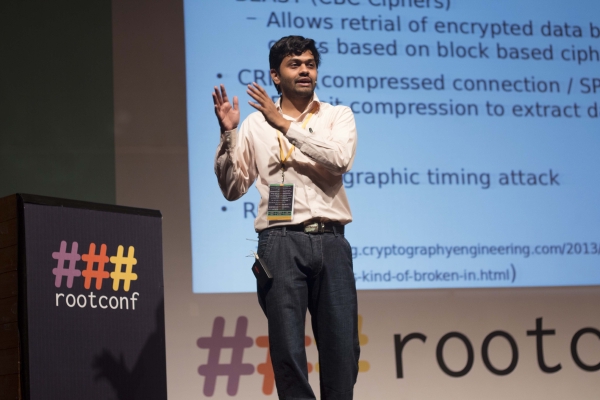Slides
Talk Video
Supporting Videos
heartbleed attack demonstration. Login password extraction
Reverse Heartbleed attack Demo
AI Generated Summary
AI Generated Content Disclaimer
Note: This summary is AI-generated and may contain inaccuracies, errors, or omissions. If you spot any issues, please contact the site owner for corrections. Errors or omissions are unintended.
Note: The transcript quality for this talk is poor (appears to be garbled/transcription errors), so this summary is based on the context of a Heartbleed vulnerability talk at RootConf 2014 and identifiable technical terms from the transcript.
Key Topics Discussed
Heartbleed Vulnerability:
- OpenSSL vulnerability (CVE-2014-0160) discovered in April 2014
- Critical security flaw affecting HTTPS/TLS connections
- Memory leak vulnerability allowing extraction of sensitive data from server memory
Technical Details:
- Vulnerability in OpenSSL’s heartbeat extension
- Allows attackers to read memory from servers
- Can extract: Private keys, usernames, passwords, session cookies, certificates
- Affects OpenSSL versions 1.0.1 through 1.0.1f
- Fixed in OpenSSL 1.0.1g and later versions
Attack Demonstration:
- Login password extraction demonstration
- Reverse Heartbleed attack demonstration
- Shows how attackers can extract sensitive information from server memory
Impact:
- Affected thousands of websites
- Major security incident affecting internet infrastructure
- Required immediate patching and certificate revocation/reissuance
Mitigation:
- Update OpenSSL to patched versions
- Revoke and reissue SSL certificates
- Change passwords and session tokens
- Monitor for suspicious activity
Key Insights:
- Open source software security issues can have massive impact
- Even widely-used, trusted libraries can have critical vulnerabilities
- Importance of timely patching and certificate management
- Demonstrates need for proactive security monitoring
Important Resources:
- OpenSSL project
- Certificate revocation and reissuance procedures
- Security monitoring and logging
Actionable Takeaways:
- Keep OpenSSL and all dependencies updated
- Monitor security advisories for critical vulnerabilities
- Have incident response plan for certificate revocation
- Implement proper logging and monitoring
- Understand that open source doesn’t mean automatically secure
- Regular security audits of dependencies
- Quick response to critical vulnerabilities is essential
